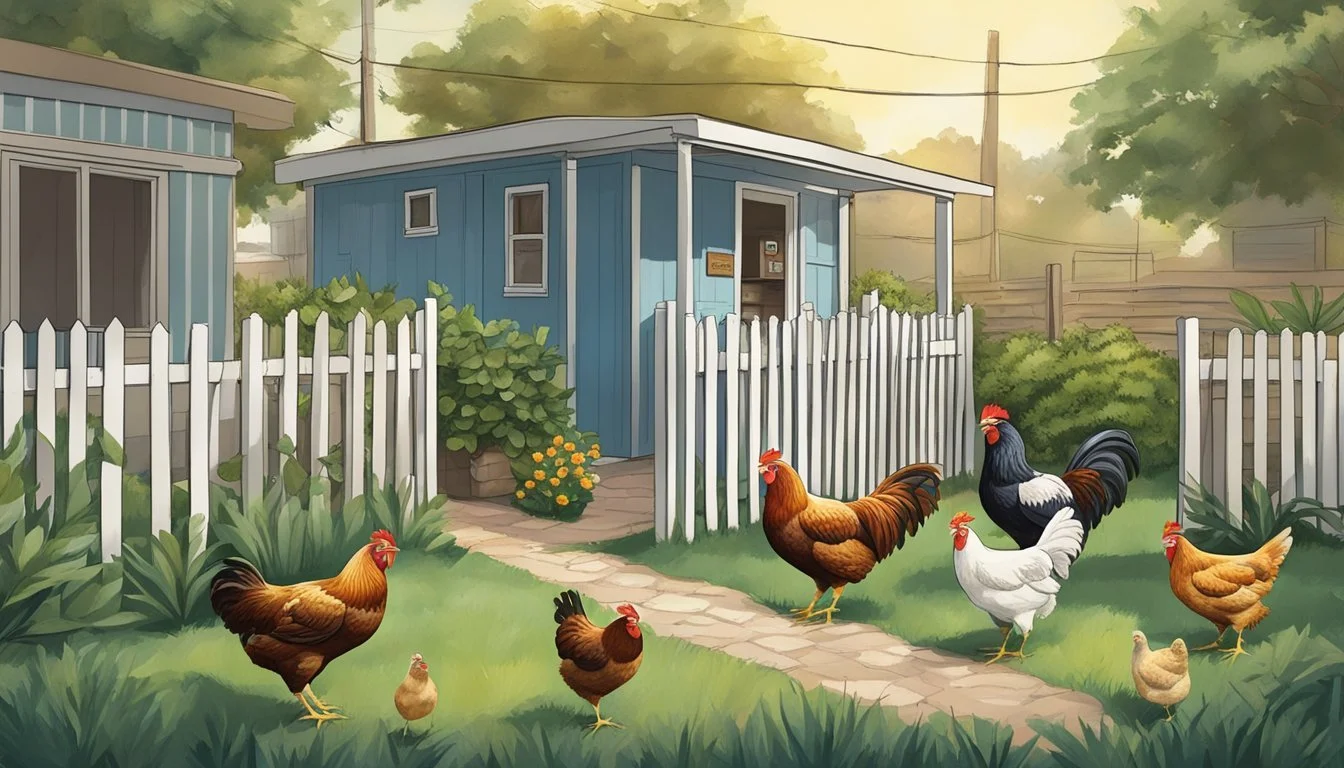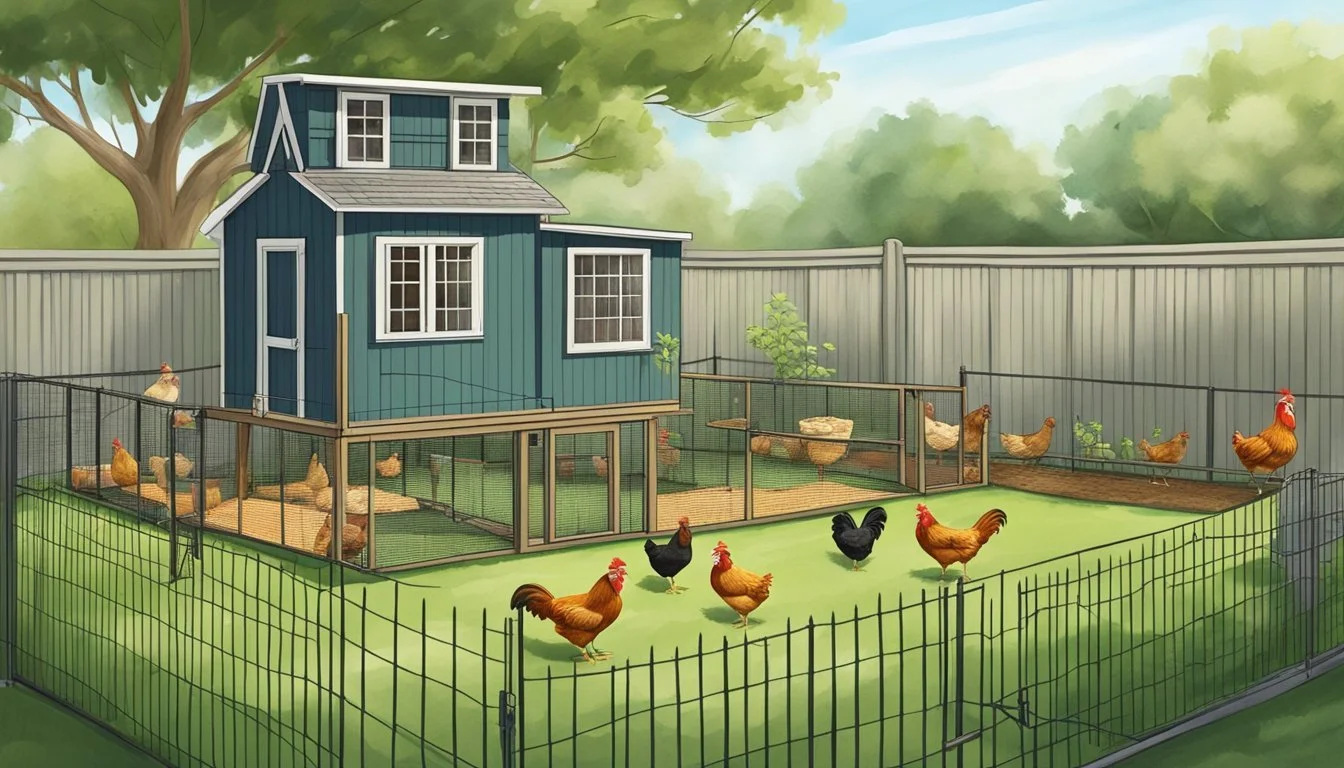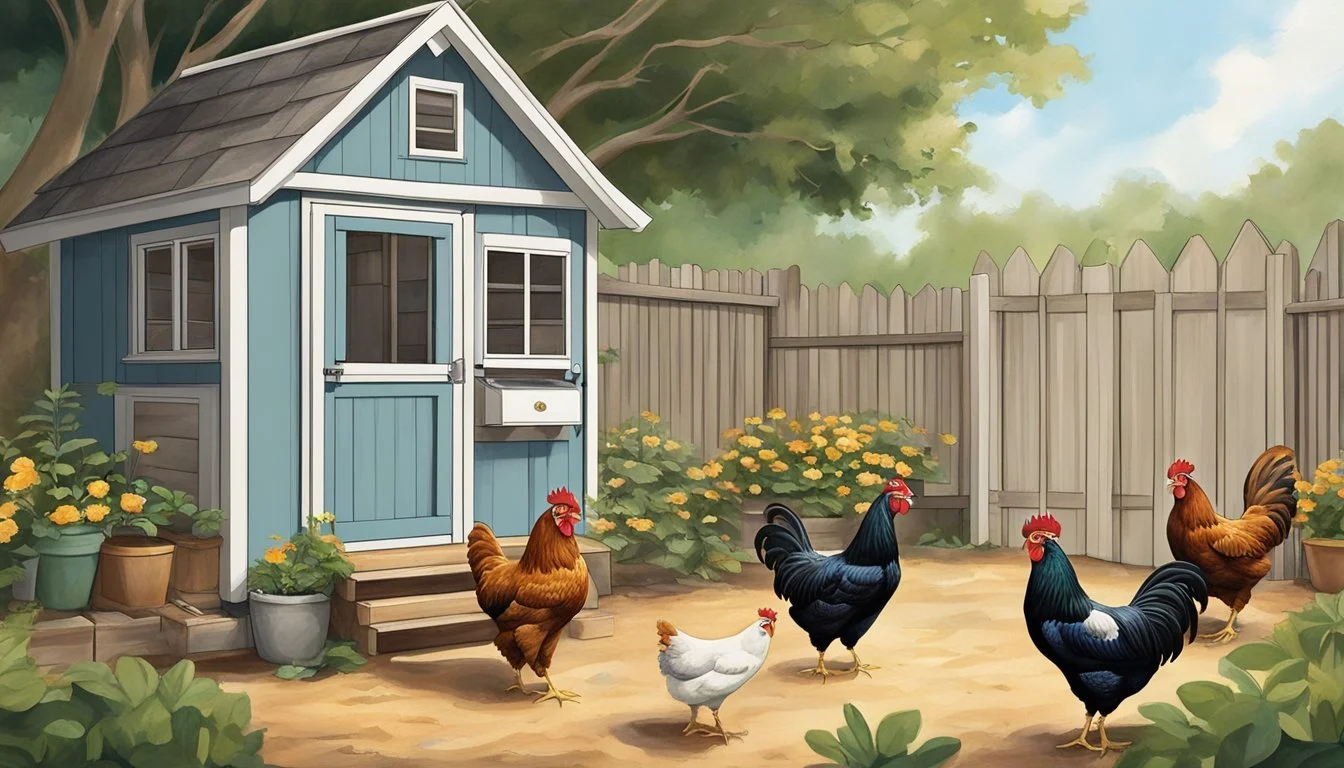Keeping Backyard Chickens in Jacksonville, FL
Essential Tips for Urban Poultry Farmers
Urban homesteading has been gaining popularity in cities across the United States, and Jacksonville, Florida, is seeing its residents embrace the trend of keeping backyard chickens. This movement is driven by the desire for sustainable living practices, including producing fresh, locally-sourced eggs, reducing food waste through natural composting, and enjoying the companionship of these birds. However, to ensure the health and safety of both the chickens and the community, the city of Jacksonville has implemented specific rules and regulations that must be followed.
Residents of Jacksonville must obtain a permit before they establish a backyard flock, which certifies adherence to the municipal code that governs the keeping of chickens within the city limits. The coop must be placed in the rear yard and situated at least 25 feet away from neighboring residences, maintaining a clean and orderly environment and minimizing any potential nuisance to surrounding neighbors. The program also limits the number of hens a household can keep, and roosters are usually not permitted because of noise concerns.
By following these guidelines, Jacksonville residents can partake in the benefits of urban poultry farming while respecting community standards. It is essential to remain informed about the obligations and the proper care required for keeping backyard chickens, as the city expects responsible stewardship of these animals to ensure a positive and cooperative urban agricultural experience.
Understanding Local Ordinances
Navigating the legal landscape of backyard chicken-keeping in Jacksonville involves understanding the city’s specific zoning requirements and obtaining the necessary permits. Adherence to these guidelines ensures compliance with local regulations.
City of Jacksonville Zoning Requirements
In Jacksonville, the city council has designated certain residential zoning districts where residents can legally keep backyard hens. These are distinct from Agriculture and Rural Residential-Acre zoning districts, which have separate regulations. To understand the zoning specifics, reference should be made to the Zoning Code Sec.656.422, which clarifies which districts allow chickens and any relevant zoning stipulations.
Chicken Ordinance and Restrictions
The chicken ordinance in Jacksonville mandates a set of restrictions to ensure neighborhood harmony and bird welfare. Up to 5 backyard hens are allowed per single-family dwelling, with increments of five permissible for each additional half-acre on lots larger than one acre. It is important to note that roosters are not permitted, and coops must be placed in the rear yard, maintaining a minimum distance of 25 feet from any neighboring residence.
Permit Requirements for Keeping Chickens
To keep chickens in Jacksonville, obtaining a permit from the city's Planning and Development Department is mandatory. The process involves an inspection to ensure compliance with the city ordinance. In addition, chicken owners are required to take a chicken-keeping seminar via the county's extension office. The permit costs $25, and there are expectations for holders to meet ongoing standards, which may involve further inspections or adherence to new regulations enacted by the Duval County or city of Jacksonville.
Setting Up Your Chicken Coop
Setting up a chicken coop involves careful planning to ensure it meets local regulations, provides a safe and clean environment for the hens, and is designed to prevent predator access.
Choosing the Right Location
The coop should be strategically placed in the rear yard, maintaining a proper distance from the property line to comply with Jacksonville's setbacks requirements. The location must offer adequate space for the hens to move around and should be on a high, well-drained area to prevent flooding.
Coop and Enclosure Design
A coop's design should provide ample ventilated space for the number of chickens reared, adhering to Jacksonville's guideline of no more than 5 hens for standard-sized lots. The enclosure must be constructed with sturdy materials and include an area for food and water, nesting boxes, and a perch.
Security Against Predators
The coop and enclosure must be predator-proof to protect the chickens from common predators such as raccoons and foxes. Utilize hardware cloth instead of chicken wire and secure all potential entry points, including windows and doors. Regular inspections of the structure are essential to maintain its integrity against possible attacks.
Maintenance and Sanitation
Regular cleaning is imperative to ensure the coop remains sanitary. All elements of the coop including nesting boxes and feeding troughs should be easy to clean. Jacksonville regulations may contain specifics on the methods and frequency of cleaning required to prevent odors and attractants for pests.
Chicken Care Essentials
Proper care for backyard chickens in Jacksonville involves maintaining a balance of good nutrition, health practices, and efficient egg management.
Feeding and Nutrition
Chickens require a diet that caters to their nutritional needs, which includes a balance of proteins, carbohydrates, vitamins, and minerals. Starter feeds high in protein are important for chicks, while layers benefit from calcium-rich formulations to support eggshell strength.
Chick Starter Feed: 18-20% protein for chicks up to 6 weeks old.
Grower Feed: 16-18% protein for chickens 6-20 weeks old.
Layer Feed: 16% protein with added calcium for egg-laying hens.
Fresh water should be available at all times and feeders should be kept clean to prevent the spread of disease.
Health and Hygiene
Regular cleaning is crucial for the prevention of disease and pests in the chicken coop. Chicken keepers should maintain a routine that includes the removal of waste and the replacement of bedding materials to ensure a clean environment.
Sanitation Schedule:
Daily: Remove visible waste and leftover food.
Weekly: Change bedding and clean feeders and waterers.
Monthly: Deep clean coop and inspect for pests.
Health checks should also be routinely performed to monitor for any signs of illness or injury. Vaccinations should be kept up-to-date as per veterinary advice.
Egg Collection and Use
To ensure freshness and minimize the risk of bacterial contamination, eggs should be collected regularly, ideally once in the morning and again in the evening.
Egg Collection Guidelines:
Frequency: Twice daily.
Storage: Place eggs in a cool, dry place or refrigerate quickly.
Cleaning: Gently clean soiled eggs with a dry cloth or fine sandpaper.
Eggs should be used within a reasonable time frame to ensure their nutritional value and taste are preserved. If selling or sharing eggs, one must comply with local regulations regarding labeling and food safety.
Understanding the Impact
The inclusion of backyard chickens in Jacksonville, FL, has resonated across various aspects of community living, from sustainability efforts to local regulations.
Benefits of Raising Chickens
Residents who participate in raising backyard hens contribute to a sustainable lifestyle by producing fresh eggs, reducing food waste through natural composting, and enhancing soil fertility. The backyard hen program permit is a step towards responsible urban farming. It allows Jacksonville's citizens to not only know exactly where their eggs come from but also to engage with the natural food production process right in their own yards.
Fresh egg production
Natural composting and waste reduction
Soil fertility enhancement
Connection with the food source
Addressing Neighbors' Concerns
While backyard chickens are an asset to some, they can be a nuisance to others. Common issues include noise, odors, and potential attraction of predators or pests. Florida chicken ordinances are in place to address these concerns, mandating the placement and upkeep of coops to minimize any negative impact on the surrounding community. Neighbors' worries about the potential nuisance can often be allayed by following proper guidelines and maintaining open communication lines.
Guidelines for coop placement (25 feet from neighboring residences)
Upkeep and sanitation requirements
Lines of communication with neighbors
Local Support and Resources
The University of Florida Institute of Food and Agricultural Sciences Extension serves as an educational hub, offering classes for those interested in backyard poultry. These programs aim to educate prospective and current chicken owners about best practices and local regulations, thereby ensuring a well-informed community. Online chat boards and local online communities also provide a platform for residents to share experiences, tips, and discuss Florida chicken ordinances.
UF/IFAS Extension: Classes for proper chicken raising techniques
Online chat boards: Community sharing and support
Permit Application: Mandatory for legal backyard chicken raising
Legal Considerations
Residents of Jacksonville keeping backyard chickens must navigate specific legal guidelines to maintain compliance with the city's ordinance code. These regulations ensure that chicken keeping is safe, courteous to neighbors, and environmentally responsible.
Compliance with Slaughtering Laws
Jacksonville's ordinance prohibits the slaughtering of chickens in residential areas. Individuals must adhere to this regulation as part of the city's broader effort to maintain public health and adhere to zoning laws. Failure to follow slaughtering laws can result in penalties and legal action by the city authorities.
Handling Waste and Composting
Managing chicken waste effectively is a key consideration under Jacksonville's backyard chicken regulations. Residents are encouraged to employ composting as a means of waste management to minimize odors and maintain sanitary conditions.
Composting must be done in a manner that prevents attraction of pests.
Proper aeration and moisture balance should be maintained to aid in the composting process.
The city’s code of ordinances contains provisions that illustrate how residents should dispose of waste and outlines practices for proper composting. Adherence to these regulations is necessary to avoid a potential legal fight with the city and ensure a harmonious coexistence with the surrounding community.
Special Topics and Concerns
When keeping backyard chickens in Jacksonville, FL, it is important to consider the interactions with household pets and the potential impact on local wildlife. Addressing these topics proactively ensures a harmonious and sustainable environment.
Managing Pets and Backyard Chickens
Household pets, particularly dogs and cats, often have a natural curiosity or prey drive towards chickens. It’s crucial for the safety of the poultry that pet owners:
Train their dogs to accept chickens as part of the family, actively discouraging chasing or aggressive behavior.
Supervise interactions closely until pets show consistent disregard for the chickens as prey.
Erect secure fencing to separate the chickens' space from areas where pets roam.
Impact on Local Wildlife
Backyard chickens can affect local wildlife in several ways. They can become both predators and prey. In Jacksonville, precautions should be taken to protect poultry from native predators such as:
Raptors (hawks, eagles)
Mammalian predators (foxes, raccoons, rodents)
Chickens can also become a nuisance by attracting pests or becoming pests themselves if they escape into neighbors' yards or natural areas. To mitigate these issues:
Ensure coops are impenetrable by rodents and other small animals seeking food.
Regularly maintain the cleanliness of the coop to avoid attracting wild animals with feed or waste.
Implement barriers or deterrents to protect chickens and minimize their disturbance to the ecosystem.
Additional Elements of Urban Chicken Keeping
Urban chicken keeping in Jacksonville, FL is subject to specific regulations that ensure the welfare of the chickens and compatibility with urban living. Individuals must navigate local regulations and consider spatial limitations, especially when raising chickens near apartments or within small outside spaces.
Understanding the Role of the Planning and Development Department
The Planning and Development Department in Jacksonville plays a crucial role in urban chicken keeping. It is the authority that issues permits for chicken coops on residential lots. Each permit, which aims to maintain order in urban livestock keeping, comes with conditions:
Limit of up to 5 hens for standard lots
Coop/pen placement: Must be in the rear yard
Required distance: 25 feet away from neighboring residences
Expansion options: If the lot size exceeds 1 acre, additional chickens may be allowed
Moreover, local zoning regulations prohibit keeping poultry on the lower floor of any premises with a residence overhead in commercial districts. A permit is mandatory, and prospective chicken keepers are required to attend a seminar provided by the county extension office.
Potential Issues with Neighboring Apartments and Small Outside Spaces
When raising chickens in proximity to neighboring apartments or managing small outside spaces, several issues may arise:
Noise: Chickens can be noisy, which might lead to complaints from residents of neighboring apartments.
Space: The coop/pen needs to be designed to meet the spatial constraints of smaller residential lots without compromising the chickens' welfare.
Health: Proper sanitation measures need to be taken to prevent odor and pest issues, which can affect nearby apartment dwellers.
Jacksonville's urban chicken keepers must consider these specific conditions and tailor their chicken-keeping practices to fit within the framework of city living. Compliance with city regulations will help mitigate potential issues with neighbors and ensure a successful urban chicken-keeping experience.
Broader Context
Backyard chicken keeping in Jacksonville, FL, reflects a broader trend within the state that balances urban living with a touch of agricultural self-sufficiency. This practice connects urban residents with Florida's deep agricultural roots, while various regulations ensure harmony with city living.
Chicken Keeping in the Larger Scope of Florida's Agriculture
In Florida, agriculture constitutes a key component of the state economy, with chickens playing a significant role in this. The allowance of backyard chickens in Jacksonville aligns with Florida's larger agricultural practices, promoting sustainability and local food production. The regulations set forth by Jacksonville's Planning and Development Department strive to integrate small-scale, residential poultry-keeping into the urban fabric without disrupting the overall harmony of the cityscape.
Comparative Insights: Jacksonville vs Other Florida Cities
When comparing Jacksonville's regulations with other Florida cities, it becomes evident that each municipality has its own approach. Jacksonville requires residents to obtain a permit for keeping chickens and maintains specific coop placement guidelines, such as the 25-foot distance from neighboring residences. Other cities in Florida might have different restrictions or allowances, reflecting their unique community standards and planning priorities. For example, some may not require a permit, while others may have more stringent or lenient spacing requirements.
The City of Jacksonville has carefully considered local concerns and planning implications to frame its chicken-keeping regulations, demonstrating a tailored approach that respects the city's urban character while supporting residents' agricultural interests within Duval County.









